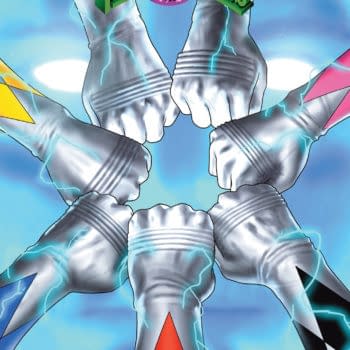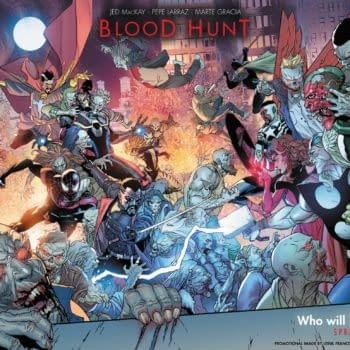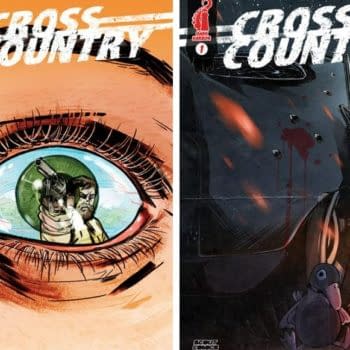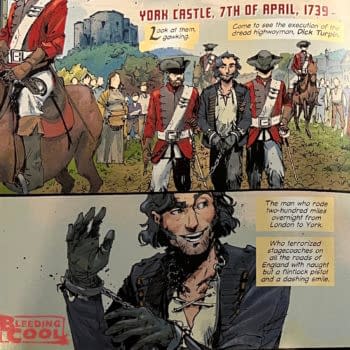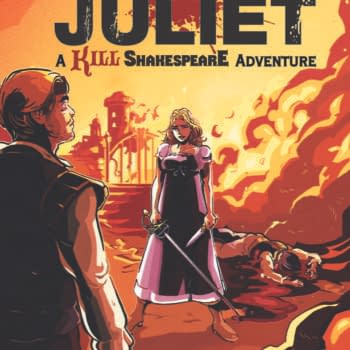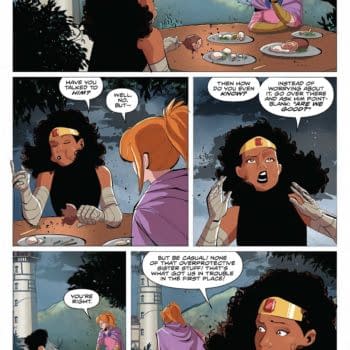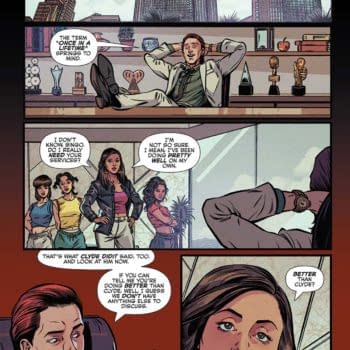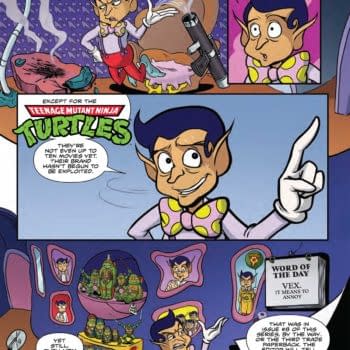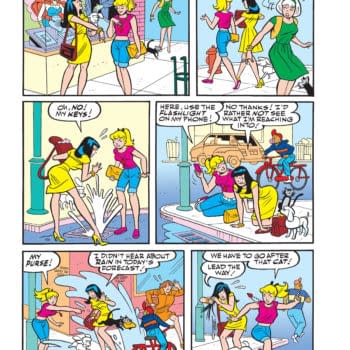Posted in: Comics, Recent Updates | Tagged: Comics
Eric Stephenson, Publisher Of Image Comics – The Interview

Image's market share has been slipping of late. At one point you were the second most ordered publisher in the industry, ahead of DC on much fewer books. Now IDW is often beating you. Is this a worry and what are you planning to counter it?
Well, I can see where you might think that, because IDW did a really good job of highlighting their market share gains last year and as a result they were moved to the front of the Diamond catalog, but what you're saying here, it's not really true. Over the last 19 months, IDW has been ahead of Image in market share a grand total of three times, and just once so far this year. Even if you go further back, to the beginning of 2009, we're still only talking about five instances in 22 months. I'm not sure that kind of average translates into "often."
And you know, it's not like Image was the number two publisher for a good long run there. Historically speaking, it was something of an anomaly, and not even based on final sales figures. It was based off initial orders for specific months' worth of solicitations. Few of those books actually shipped on time. I think almost anyone looking at market share over the 18 years since Image was founded would associate Image more with holding the number three position. It's not like it's been this huge drop from number two to number four. Image and Dark Horse have taken turns rounding out the top four for the better part of the last 10 years.
The thing with IDW, especially last year, is that they pretty much live or die on licensed properties, and we don't really do that kind of material. Last year, IDW had a lot of help from the Star Trek movie, they had a lot of help from the GI Joe movie and they had a lot of help from the second Transformers film. Oh, and they had Angel and the various spin-offs that relate to that. Did they have other good material? Of course: That Parker book by Darwyn Cooke is one of my favorite graphic novels of the last few years and that's not their only successful non-licensed book, but I'm fairly certain that when you tally up their sales for 2009, the bulk of what carried them over the plate in terms of overall market share were those licensed books, especially the books supported by three very successful summer films. They made a lot of noise about that, and you know, more power to them, they had an awesome year, but at the end of the day, the real story there is that they did a great job of selling Stark Trek, GI Joe, Transformers and Angel to an audience that was predisposed to buying Star Trek, GI Joe, Transformers and Angel. IDW have put out some nice things this year, but I think their market share over the course of 2010 reflects the fact they haven't had three gigantic films to support their line.
As far as Image is concerned, we're in the midst of our best year in nearly a decade, so it's a little odd that you'd even frame your question that way. I mean, we've been in and out of number three for the last few months. After that hiccup where we missed shipping The Walking Dead, Spawn and Invincible in March and dropped to number six, we actually bounced right back to number three for April. There was lots of publicity about Image being at number six; there was zero about the fact that we went back to number three the next month. We've had a great year, and I think that's down to the strength of the material we're putting out. And yeah, a lot of people are going to roll their eyes and say, "Well, that's just because you do The Walking Dead and that's going to be a TV series," but the truth of the matter is The Walking Dead was increasing in sales long before there was any discussion of a TV series on AMC or anywhere else. The book's been climbing in sales since it launched in 2003. The first issue launched at under 10,000, which I think people tend to forget or ignore, and looking at current orders, we're getting ready to ship out #78 at over 30,000 units. And you know, I saw that Oni did this press release about the six Scott Pilgrim books selling over a million copies all told: The Walking Dead collections are closing in on three million.
What's even better, though, is that The Walking Dead isn't alone. Invincible? That's been steadily increasing in sales, and since it debuted last year, Chew has been a phenomenal success that is growing along similar lines. The Chew trade paperbacks have been in the New York Times bestselling graphic novels list almost as regularly as The Walking Dead. New series like Morning Glories and Skullkickers are performing similarly, launching at what I would characterize as less than spectacular numbers, but then selling out immediately, with strong enough demand to warrant multiple printings. And it's not because they're tied to movies or to TV shows, it's because they're good books that aren't like everything else. On top of that, there are some of our more quiet successes: James Stokoe's Orc Stain is slowly increasing in sales, Joe Kelly and Ken Niimura's I Kill Giants trade is in its third printing, we had to immediately go back to press on Tim Seeley's Hack/Slash Omnibus, Eric Shanower's Age of Bronze collections, the Elephantmen trades and the Mice Templar books continue to turn over… Books like Choker, Haunt and Turf, although a little behind on their scheduling, have sold incredibly well. The most recent printing of Garth Ennis, Jimmy Palmiotti and Amanda Conner's The Pro was ordered higher than the printing before that — there are 75,000 copies of that book in print at this point.
Maybe I just don't beat my chest about this stuff often enough, but honestly, I think we're in a pretty great place right now. We do the best creator-owned comics by a fantastic mix of both new and established talent. And those successes I was talking about earlier? The Walking Dead, Invincible, Chew, Haunt, Skullkickers, Orc Stain, Turf — they're all $2.99. Morning Glories is $3.50. We have a smattering of books at $3.99, but by and large, we've kept our books in the $2.99 – $3.50 range AND we've been slowly pruning the line down, doing fewer books overall. There are publishers out there pumping out more and more books, and at $3.99 a pop, and we're doing the opposite of that, because it makes it easier for readers on a budget, it makes it less of a burden on retailers to stock everything and more to the point, it just seems like the most responsible course of action for a publisher to take in the midst of a recession. And considering the news coming out of New York show recently, it looks like Marvel and DC finally get that much, at least.
We're not trying to glut the market with a eleven different comics featuring the same characters, we're not trying to force readers into reading mammoth crossover events with dozens of tie-ins. We're just doing what we've always done — putting out good creator-owned comics — and I think after slowly improving our line over the last five years or so, we're better at that than we've been in some time, and I think it shows.
The argument has been made that Image is a place where creators can make a LOT more money on their books than at other publishers. But multi-media rights aside, a number of books don't seem to make the creators anything. Even a critically acclaimed, well promoted book like Phonogram couldn't continue if artist Jamie McKelvie wanted to make his rent. How do you square that circle?
First, there are a number of creators at Image who make a lot of money. And yes, there are also a number of creators who don't. How do I reconcile that? Well, a couple ways. To begin with, let me tell you something about being critically acclaimed. It often doesn't get you a damn thing. Whether we're talking comics or film or music or books — there is a near endless list of "critically acclaimed" material out there that sells poorly by comparison. I mean, yeah, you can be The Beatles or Radiohead and critical acclaim and world-beating sales go hand-in-hand, but you can also be Nick Drake or Elliott Smith and die a critically acclaimed cult star who's barely scraping by. Age of Bronze sells quite nicely as a trade paperback collection, but it doesn't do so hot in singles. And it's a multiple Eisner winner. It's been written up in archeological journals. It's used in schools. It's a brilliant, brilliant piece of work. That doesn't translate into sales for the comic.
And you know, your example here — Phonogram — that's another amazing piece of work and yes, it's received a lot of acclaim, not just from within the comics industry, but also in the music press and from actual bands and the like. Jamie's a fantastic artist and Kieron's a brilliant writer and I don't think there's much disputing that, but now we're in a similar situation with Phonogram as we are with Age of Bronze. The two trades — they both sell well. Jamie and Kieron will be earning nice dividends on those two books for a good long while, which is probably a bit of a relief, but it doesn't negate the fact sales on the singles simply weren't there. But that's not where the similarity to Age of Bronze ends.
Both Age of Bronze and Phonogram — and you know, they're not alone in this, they're not the only examples — have come out fairly erratically. Age of Bronze comes out a few times a year, when we solicit it, because that's how often Eric Shanower can complete the work — he puts so much research and physical work into the book and it's a grueling process — it's in no way monthly. Phonogram was beset with scheduling problems almost from the beginning and didn't ship monthly. Now, regardless of what factors go into the shipping schedule for either book, I can say without a doubt that sales on both books suffer from that kind of erratic shipping. Whether it's late shipping or bi-monthly shipping or quarterly shipping — whatever — it will hurt sales and no matter how well-received something is in the beginning or how many awards a book receives, there's going to be a loss of momentum.
Looking at a book like Chew — it wasn't ordered spectacularly to begin with, but it came out on time and it came out regularly and people liked it and sales shot up. The most important thing for a book, whether it's critically acclaimed or simply well-liked, is that it actually comes out.
But for some creators they are being asked to sacrifice the possibility of a regular Marvel/DC paycheck to work on a book that has no guarantee they will make any money at all – and if they do, it will be a long time coming. Can you understand why so many seem reluctant?
For an artist? Definitely. For a writer? Not so much. If you've got your own ideas, you've got them written down in your notebook or in a folder on your computer. Getting a pitch and a couple issues doesn't take that long. I've done it. You've done it. You either make time to do something you believe in or you don't. The only cost is time. For an artist, it's a greater amount of time invested, and with no money on the table, there's absolutely a reason to be reluctant.

I think you may be misunderstanding what John's telling you, because Chew makes fantastic money, both in single issue form and as collections. You say John "had to sign over a lot of the profits" — I don't think John had to do anything, he did that because he wanted Rob to be compensated for his work and he was willing to take that hit early on to get things up and running. Now that they are, both Rob and John do quite nicely and yes, if everything works out with the television deal, they'll be doing even more nicely still.
Is it ideal for a writer to take the greater financial hit to keep the artist happy? Well, I'll put this way: Most writers can do more than one book a month. I mean, there are some writers who write more than five books a month. Generally speaking, today's artists are capable of producing a single book a month. There's obviously room for some negotiation there, between the writer and the artist, especially if the entire idea originated with the writer and the artist was brought onto the project later, but I think that especially in the beginning, an awful lot is riding on the artist's shoulders. If the book's a success, it all works out, but yes, there is going to be risk involved. That should go without saying. There's going to be risk in any business venture that involves retaining ownership. If I was starting a restaurant, I'd have to put up the cash to secure a space, hire a staff, etc. It's my business, it's my risk.
I'm not sure "risk" and "ideal" really belong in the same sentence together. Is gambling a load of dough ever ideal? No, but that's what makes it a risk, isn't it?
Indeed it is. Case in point, the This Is A Souvenir anthology I contributed to that came out quite some time ago. Haven't heard anything about potential payment for me or my artist on that. Not even that there isn't going to be any.
Well, I think we talked about this a bit back when there was some concern over the Tori Amos book, but trade paperbacks, graphic novels — they don't always earn out right away. Depending on the costs involved — and with the Tori Amos book in particular, that was an expensive book to produce and an expensive book to market — it took a while. And that was an incredibly successful book.
The Spearmint book hasn't earned out, and I actually believe you and I have been over this before, but it hasn't been as successful as we'd hoped. After doing the Belle and Sebastian book and the Tori Amos book, I thought it might be possible to take a great band people weren't all that familiar with and sell the book on the merits of the work and the creators involved. The other two books were incredibly successful, and it stood to reason that would be a factor in retailers' decisions to bring the book into their shops, in readers' decisions to buy the book. But you know, it wasn't, and the book hasn't earned out. The hope obviously, is that it eventually will and everyone will get a little something back for their efforts, but right now, that's not the case.
Don't you believe it's important to keep people in the loop on this? Even to let them know that "Sorry! Nothing this year!"? The biggest complaint I get about Image from Image creators is one of a lack of communication, Unanswered emails, sometime for months. Do you see an infrastructure problem at all?
I think you just described most entertainment companies. I've been a freelancer, Rich, I know what it's like not to hear back from editors. There are plenty of people who don't get back to me now. Does that make it all right? Of course not, but to suggest it's a problem specific to Image is ridiculous. It's something everyone wrestles with to some degree or another, and ultimately, I think we all want to be better at getting back to people.
Well there is the problem of brain drain. Brian Bendis, Mark Millar, The creators who make the big books get courted by Marvel, with their own Image-alike book. Aside form putting creators on the board of Image, how do you keep them at Image?
Mark was already at Marvel, though, and then he did a couple things over here, so that's not really a good comparison. I mean, Mark referred Jonathan Ross and Tommy Lee Edwards to us. Will Mark do more books here in the future? You'd have to ask him that, but we have a good relationship with him and certainly don't begrudge him his work at Marvel. Mark's earned every bit of success he's had, no matter where the work is at, and I'd say that about anyone who has been at Image and then gone elsewhere. I mean, look at Bendis: Brian started out doing black and white indie comics at Caliber, moved over to Image under Jim Valentino's "non-line" and then started doing Sam & Twitch and Powers alongside things like Daredevil and Ultimate Spider-Man. He's just gone from strength to strength, and you know, Icon was more or less created specifically for him. And I'll be honest with you, that wouldn't have happened if Image didn't exist and if Brian hadn't had the success he had here. Without Image and a deal that wholeheartedly favored creators and creator-ownership, Marvel would not have created Icon. I'm not saying that to be boastful or arrogant, but I don't think it's a coincidence they didn't have an imprint like Icon until they wanted to have all Brian's work under one tent. Would we have preferred Brian to continue doing Powers here? Well, duh. Brian's a phenomenal talent and a great guy and Powers was a great book. I was pretty gutted when he chose to leave, but you know, Brian did what he felt was best for himself under the circumstances.
The thing is, Rich, people are always going to come and go. The Image Comics of October 2010 is virtually indistinguishable from the Image Comics of October 1992. Or 1995. Or 2000. Warren Ellis once said that the best way to describe Image Comics is to say, "Image Comics is new comics," and I think you can look at the company at multiple points in its history and see that there are always new creators and there are always new titles. It's what we do. And whereas some might see that as a bad thing, it's actually one of our greatest strengths. We don't have dozens of titles mired in 60-plus years of continuity that we're constantly trying to decide if we want to disregard or keep straight. We're not in the position of publishing books just to keep a mark in print or to support licensing. We're here to provide a home for creators who want to do their own thing, and sometimes that's going to work out on a long-term basis, sometimes it's not. Asking "how do you keep them at Image?" is like asking how to prevent couples from getting divorced, it's just unrealistic and not really how we think here.
And with that in mind: Robert wasn't offered partnership in Image as a way to bind him to the company. The other partners made that offer because Robert was the first creator to come along who shared their vision of what Image is and what it should be and despite doing some work at Marvel for a few years there, his commitment to Image had been made just abundantly clear over the time he's been with the company. It was more a situation of "Robert's one of us," than anything else, really. There was no deal struck to make Robert exclusive to Image, anymore than there was for the other partners.
Image really isn't about limiting creators' options. That's why we don't have exclusives. We're not trying to tie anyone down so they can't get off the plantation, and make no mistake, the shackles may be solid gold, but there's only so much freedom in that kind of arrangement. What we've got here… Obviously, there are pros and cons to the kind of creative freedom we offer, and as you just said, not every book is a guaranteed success. And yeah, Marvel and DC — let's not forget DC, because virtually every artist to ever work with Jay Faerber on Noble Causes or Dynamo 5 has been scooped up by DC and every member of Richard Starkings' ELEPHANTMEN team were snatched up to produce THE SPIRIT — are constantly sniffing around here looking for new talent. Dark Horse does the same thing — they even tried to lure Kirkman away back when The Walking Dead first took off. He and Tony Moore had pitched a book there and it was turned down, but the minute The Walking Dead was a hit, Dark Horse was on the phone telling Robert how much better he could have it at Dark Horse. How much work by Nick Spencer did you see from Marvel and DC before Morning Glories took off? Now he's one of Marvel's up-and-comers. I'm not sure if Nick should be flattered or insulted.
Waiting for books and creators to show their worth at Image and poaching them seems like a lazy, cowardly way of publishing comics, but you're right, it happens. It happens all the time. There's something really cool about being the guys who actually take chances on new ideas and support new creators that haven't been road tested elsewhere. We're the guys who pulled Jonathan Hickman's Nightly News out of the submissions pile — a blind submission — immediately recognized it was brilliant and published it. Same thing with the Luna Brothers and Ultra. When Warren Ellis said he wanted to do a $1.99 comic at a point when prices were starting to creep up to $3.50, to $3.99, we're the guys who said, yeah, let's do it. Vertigo turned Chew down — we're the guys who thought it sounded like an awesome idea. We didn't wait for it to come out and prove it's worth and then get some celebrity chef to write his own crime/food comic. Meanwhile, Chew outsells just about every book Vertigo does.
I think we actually do something really special here, and yeah, not everything hits, and it's obviously going to work better for some than it does for others, but ultimately, I think this is a great place to do comics, a great place to explore your talent, to explore new ideas, and the people who appreciate that tend to stick around. If they wind up doing all or most of their work here, that's great, but we're not trying to tie anyone down or hold anybody back.
Okay, well here's one issue I get time and time again. By making one creator on the book the sole contact, decision maker and payment person for Image Comics has led to a number of abuses where that creator has not paid the other creators on the book. Does Image have any plans to counter this at all? I mean I am about to be paid for Chase Variant (came out in January) – if I don't pay my contributors, doesn't that end up harming Image as well as myself?
Well, there are creators who have done exactly what you're describing, I'm sorry to say, and you know, at the end of the day, I don't mind throwing someone like that under the bus. That's a shitty way to reward your collaborators and your publisher for having faith in you and your project, and ultimately, I think it reflects more on the creator than it does on Image. And anecdotally — there are artists who have worked with some of these people, and they are more wary of the individuals who screwed them than they are of Image.
But you know, here's the deal, Rich: We do have publishing agreements with both writer and artist. Generally speaking, both writer and artist co-own the material if we enter into that kind of agreement. What you're talking about here really depends on the situation, on the individual creators. Some writers hire an artist to draw their book and they're not interested in sharing the rights with them, and in those cases, it's the writer on the contract. Is that fair? That's up to the writer and the artist involved to decide, I think. Some artists may not care, so long as they've being adequately compensated. That arrangement may not work for others. It's a case-by-case thing that really needs to be sorted out before the project ever reaches us here.
Would you mind naming the greatest transgressors? Bleeding Cool is a fairly big bus…
That's actually not what I meant: What I'm saying is that if a colorist or a letterer or an artist is being given the runaround from whoever contracted with Image, I don't have a problem explaining the situation and making it clear where the disconnect happened. I don't think discussing that sort of thing in an interview or on a message board or via Twitter or whatever is particularly good form, though. I always wince whenever I see people get into those discussions online, because I don't think either party comes off well.
There's also the practice where a writer pays an artist in advance to create a book for Image then sees far less in money from Image, leading the book to crash and burn and a heavily-in-debt writer who may not go to Image again. Any plans to help with this situation?
There are instances wherein we've paid advances to artists. When we do so, however, we have to get something in return. These big corporations — at this point, it's just as apt to say Disney and Warner Brothers as it is Marvel and DC, and I think it really drives the point home a bit better — they own everything they're producing. When they pay out page rates, whether they're expecting to earn out or not, they're looking at the long game. They can exploit the characters and stories in other media, and there's some assurance they'll see a return on the money they've paid out for the comics. Meanwhile, Image doesn't own the characters — the creators do. Image doesn't own the media rights — the creators do. The only way it makes sense for Image to offer page rates or advances is if it benefits the company in some way. I mean, Image is not a charity. We're not just going to go into the hole to make sure a writer doesn't go into debt, with no chance of compensation. Where is the sense in that? If someone wants upfront money, then Image has to get something on the back end, and I think that's fair and well in line with the company's principals.
This also goes back to what I was saying just now about writers who don't want to share the rights of the property with the artist. They want an art monkey to draw their story, not a collaborator or a partner, and rather than find someone willing to share the burden of the work in exchange for participation in profits from the comic and any potential media rights, they enter into a work-for-hire agreement. That increases the financial burden on the writer and distances the artist from the material in a way co-ownership wouldn't.
But as far as I can tell, Image is a company that demands creators be businessmen. But, as we have discovered, a lot of creators make bad businessmen. Joe Quesada has famously stated that the worst exploitation of creators has come from other creators rather than pure business suits. Isn't that a flaw in the heart of Image's business model?
Really? I guess I missed the example of creators exploiting other creators that overshadows Marvel's poor treatment of Jack Kirby. And that's the first and most notable instance of that sort of thing that springs to mind. I mean, no offense to Joe Quesada, because I don't disagree that some creators are poor businessmen, but I take issue with the fact that they're worse than what he terms "suits." Furthermore, I don't see how his statement applies to Image whatsoever. There are publishers out there with supposed creator ownership deals that tie up the creator's media rights, that take 50% or more of everything a property generates and that strikes me as fairly exploitative, but Image has survived for nearly 20 years by allowing creators to chart their own course and retain the rights to their work while they're doing it. I mean, people can twist things around however they want, but at the end of the day, Image offers creators the most generous publishing deal in comics, so right there, no one at Image, none of the founders or partners, is guilty of exploiting other creators. If a creator comes to Image and sets up a project and then winds up doing something that negatively impacts another creator that he or she is working with, that's not a flaw in Image's business model, it's a flaw in that individual creator's character.
Well Pat Lee came instantly to mind for me. But I think there is a problem – on a Marvel and DC book, the individual creators are paid individually for their work. On an Image book, the lead creator is paid for everyone's work, to distribute as agreed. That can be a weak link in the chain and could lead to unnecessary problems. Especially when they are someone like Pat Lee, say. Is there a better solution?
Well, Pat Lee hasn't had a relationship with Image since 2001, so I'm not sure how that's relevant to anything here.
I understand that you think there is a problem, because it's not something you're used to, but going back to your original question, I'll say again that I think that has less to do with how Image does business than unscrupulous behavior. Marvel and DC pay individual creators the way they do because they own those creators' work, not because they want to have some kind of moral or ethical safeguards in place. More to the point: There are plenty of instances in which we actually do pay creators separately. As I said earlier, it depends on who owns what and what arrangements are made with the owner of the property in question.
I mentioned issues I saw about Image being harmed by the decisions made by certain creators, even if it is then happy to throw them under the proverbial bus. But what happens when a creator is one of the directors? Do you ever worry about, or indeed regret, the PR damage that Image keeps sustaining on the whole Todd McFarlane/Neil Gaiman court cases? Each loss seems to reposition Image against the creator-friendly environment that Image has quite deservedly developed, into the stereotype of said traditional crooked publisher. And the words of another Image director Erik Larsen never really seem to help, do they?
Honestly, I don't worry about any of that too much. I have nothing but the utmost respect for both Todd and Erik. I have a lot of respect for Neil Gaiman, too, but I don't think anyone who actually knew what happened there would think Neil was taken advantage of. I think there are plenty of people in comics who would love to be taken advantage of as handsomely. I also think there's a little bit of a double standard where some of that stuff is concerned. I mean, what's the difference between the 1602 Spider-Man and Medieval Spawn? They're both derivative characters, and yet by virtue of a court judgement, Neil now co-owns one of them. Likewise, there are are original characters that have been created by many different creators at Marvel or DC, and those creators have been compensated far less fairly for that work by comparison to the situation you're referencing.
I get it, though: Todd's the bad guy. People like to demonize Todd because he doesn't do things they way they want, and there are people who will side with Neil simply because he's Neil. It's kind of bizarre, really. And people have a problem with Erik because he voices his opinion, regardless of how unpopular it may be? I'm sorry, but at least he's doing it under his own name and not hiding behind some shroud of anonymity while posting on a message board as fartcatcher4692. Do I agree with everything he says? No. Do I think sometimes it's better to leave certain topics unaddressed? Yes. I'm personally less interested in that sort of thing. I'm not Twitter. I'm not Facebook. I pretty much shun that sort of thing, so it's definitely a different approach to what I'd do, but you know, Erik has more integrity than something like 99% of the people I've met in comics, and to paraphrase Jack Nicholson, some people just can't handle the truth.
I'd argue another difference between 1602 Spider-Man and Medieval Spawn is that Neil didn't have an agreement with Marvel that he would co-own the former from the beginning. But right now retailers seem to have their own issues with one other particular truth. That The Walking Dead has gone day-and-date digital with #77, without any word of warning to retailers. This has caused them some upset. Firstly, is that issue now returnable for them, and secondly given that Image's biggest book is now cheaper, easier and earlier to get online legally for many, is this the beginning of the end of the direct market as we know it? Or is it the end of the beginning.
I don't think it's end of anything, and I was honestly a little thrown by the sheer amount of invective generated by the day-and-date release of a single Image digital title, sold at exactly the same price point as the print version of the book. Nobody was undercut, nobody had an unfair advantage, and I don't see how it's any different from offering the book for sale through any other storefront.
Virtually every comic is available digitally on the same day it's released to comic book shops — for free — and that has been the case for several years at this point. Publishers have slowly begun to establish a foothold in digital publishing, but I would be willing to bet more people downloaded The Walking Dead #77 for free than paid for it through our app. In fact, I'll even go one better and speculate that more people downloaded The Walking Dead #77 illegally than bought the print comic. And you know what? The book's sold out — we have more reorders than we can fill and we both know those reorders wouldn't be coming in if retailers weren't selling out of the books.
You can get The Walking Dead #1 free on the Image app and on the Image Website. We ran it free on Newsarama at one point. That issue, along with many others, is widely available at absolutely no cost, but we just went back to press on Image Firsts: The Walking Dead #1 because we blew through the first printing and continue to receive reorders by the hundreds. We're going back to press on other Image Firsts books, too, and you know, those books are only a dollar, but that's still a dollar more than free.
So no, it isn't the end of the direct market, and in fact, I think it's a good thing for the direct market. These illegal comics? These free, illegal comics — they've been out there for years, downloaded by the tens of thousands, the hundreds of thousands in some cases, and just using The Walking Dead as an example, it doesn't seem to have hurt. We're selling more singles, we're selling more trades. I think there's growing evidence this is actually a good thing for everybody involved.
And you know what, we put our money where our mouth is on that one: Retailers wanted The Walking Dead #77 to be returnable, and we did it. We haven't had many come back.
Of course Image seem to be helping the direct market in one particular way. When Image began, it was buoyed by the speculator boom, which raised expectations for potential collectors and investors, only for many of those expectations to crash later. Many years later, there seems no be a new speculator bubble around certain Image books, namely The Walking Dead, Chew, Morning Glories and Skullkickers. Is this something you welcome or does it raise worries?
I think I'd be a little concerned if the quality wasn't there, but the books you just listed are all really, really good. Maybe there are some people out there scooping up first printings of what look like sleeper hits in the making as a speculative measure, but at the same time, these books are drumming up that critical acclaim you mentioned earlier. That wasn't always the case with the books people were speculating on in the early '90s. There was a lot of crazy stuff coming out from virtually every publisher and some of it just wasn't very good. We were all complicit in that, though. It wasn't just an Image thing or a Valiant thing — Marvel, DC and Dark Horse were right there in lockstep and when readers or retailers bemoan that fact, I'll tell you what, they were there, too. Everybody was at it.
The fact of the matter, though, is that Chew launched low and after the book was previewed in The Walking Dead just prior to the release of Chew #1, demand grew to exceed supply. With Morning Glories — Nick Spencer has slowly and quietly been building a name for himself and this was the one that cemented his reputation as a writer worth following. I kind of thought it was going to happen with Forgetless or Shuddertown, but Morning Glories wound up being the book that grabbed everyone's attention. And as far as Skullkickers goes, I think that kind of ties into what we were just talking about with digital comics. We put a free Skullkickers preview on the app, collecting the stories that ran in Popgun, Vol. 2 and 3, and orders started going up. We got the word out, we showed people what to expect and momentum built from there.
It doesn't always happen that way, and like I said before, there are some great books that never manage to move the dial, or they do move it, but just very, very slowly. Maybe the success of some of these more immediate hits will start to rub off on the others. That's certainly something I'd welcome: More people realizing how amazing Orc Stain is. More people picking up Elephantmen or Gødland. More people discovering creators like Marian Churchland, Chris Giarrusso and Paul Grist. There's that saying that a rising tide raises all boats, so yeah, we're hopeful that's the case here to some extent. In the meantime, the main concern is just putting out more good books.
Beyond all that, though, I don't think there even is a "speculator bubble." Chew launched and went through the multiple printings thing a year ago. Before that, we'd done multiple printings with early issues of The Sword, with Girls, with various issues of The Walking Dead, Invincible… Both Choker and Turf sold out so quickly they necessitated second printings and you didn't mention the recent sell-outs of Artifacts or Guarding the Globe, both of which got new printings. I think the difference here is that it's happening more often. Tim Seeley's Hack/Slash moved over here from Devil's Due and it's been doing phenomenally well. We did those Hack/Slash Omnibuses and we're already going back to press on both of those, just weeks after releasing them. It's just a different situation than it was a year ago or two years ago. Instead of one thing coming out and garnering a lot of attention, there have been several in rapid succession, and as a result, people are taking a bit more notice.
Taking notice doesn't happen just by itself though, there is often a social elemnt to that. The comic shop was the social network for geeks before the internet. Now, as comics begin to go (officially) digital, do you see it as the industry's responsibility to replicate that process when buying their comics in whatever form?
I don't know, didn't message boards, Facebook and Twitter more or less replace the comic shop for that sort of thing a while ago, at least according to everyone who continues to predict the eventual demise of the comic book store? I mean, people still go to comic books stores and people still stand around and talk at comic book stores. I'm pretty sure stores like Isotope, Bergen Street Comics, Chicago Comics and Secret Headquarters would argue that comic book stores are still an excellent social network for comic book readers. There are still a great many wonderful shops out there and I think those shops are rewarded with a vibrant customer base who interact at store events, or even just on new comics day. I don't think that's going away anytime soon. Record stores aren't gone yet, and media pundits have been predicting their extinction for over a decade. Surprisingly, though, vinyl records have actually been experiencing an uptick in sales for the last few years, even as CD sales continue to drop. It think there's a lesson there for comics. The good places hang on. The bad ones either change or die. As long as there are comics and people who love comics, there's going to be a place for people to buy and talk comics.
I would imagine that as digital comics become more commonplace, there will be some form of social media component. That's happening now, to a certain degree, and I don't see why it won't continue. And like I said, a lot of that is already here. You can be a fan of virtually every comic book or creator imaginable on Facebook, there are forums all over the place, from publisher sites to news sites to online stores. Comics fandom appears to be in rude health, changing and adapting with the times. Open-minded fans are always going to be interested in what others are reading and exploring their options for new things, so I think as the market for digital comics grows, the opportunity for that experience to be enhanced online will grow along with it.
Okay, Eric, as publisher of Image Comics, and a tastemaker in general as a result, what comics are you reading these days?
Daytrippers, the Casanova reprints, iZombie, Mark Millar and Ed Brubaker's various Icon titles, the Hellboy stuff… Oh, and I really like Ultimate X. I think that's one of the best things Jeph Loeb has ever written, actually, and Arthur Adams is always amazing. Top Shelf does great stuff. I love that Superf*ckers collection they did recently. Darwyn Cooke's latest Parker book is incredible, Dan Clowes' Wilson was great. Most of my favorite comics come out through Image, though. And I don't mean that in a pandering, self-absorbed way: I genuinely like the books we publish. I don't like The Walking Dead simply because it's an Image comic, I like it because it's one of the best comics on the market, period. It's like – going back to Casanova, which isn't published here anymore – when Matt Fraction pitched that, it was a book I couldn't wait to read, and I still love that book regardless of where it's at. I'm happy to have helped it into the world and I'm so thrilled that Matt and the twins have broadened their overall audience, because all three of them are amazing talents. There's really nothing cooler than being able to put out comics you love by writers and artists you admire and enjoy and I can say that about any number of our books — Chew, Elephantmen, Orc Stain, Jack Staff, Invincible, Savage Dragon, Gødland, I Kill Giants, you name it. I have to imagine publishing unique material like that feels more satisfying than just putting out five Deadpool comics a month.
You know, if Rob Liefeld could, I'm sure he would.
Rich Johnston writes for BleedingCool.com and has had two comic stories published by Image. A third, in Outlaw Territories 2, is due soon.






